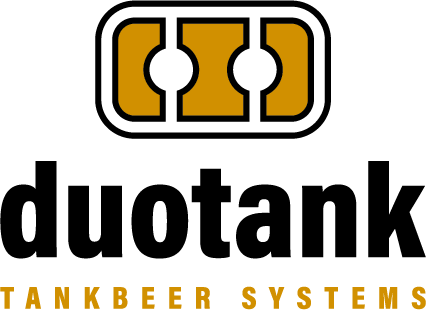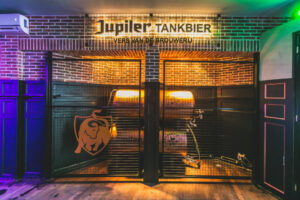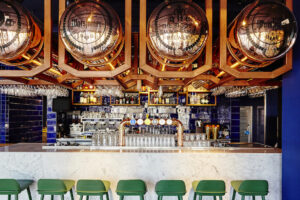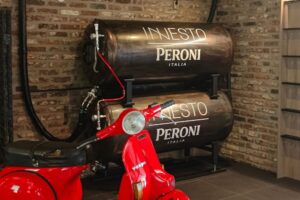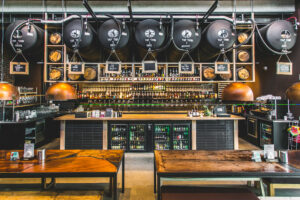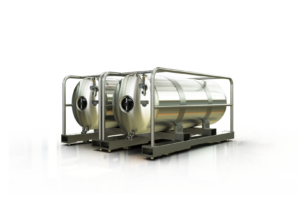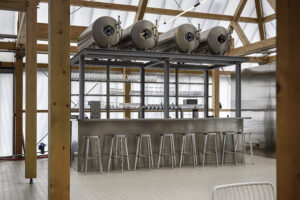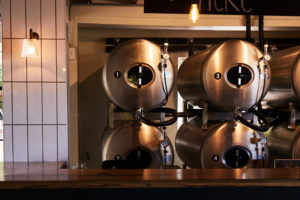As a brewer, you want to make sure your customers get the optimum experience when they order your beer in a bar.
Tankbeer systems make use of compressed air to push out beer from the inliner. Using a different gas for this process, has many advantages. In this blog, we lay out the benefits of compressed air in comparison to CO2. We focus on safety, environmental and financial benefits.
Safety
CO2 is stored under high pressure, which comes with inherent risks. In case of a leak, CO2 can displace oxygen in enclosed spaces, creating a suffocation hazard. While compressed air is also under pressure, it doesn’t pose the same risks in terms of oxygen displacement. Additionally, compressed air leaks are less dangerous, typically only wasting energy rather than posing a health risk.
Compressed air systems are easier to handle, maintain, and operate safely, especially in small workplaces. In addition, there is no requirement to move around gas cylinders or other containers. Once an air compressor is installed, there is no need to move it.
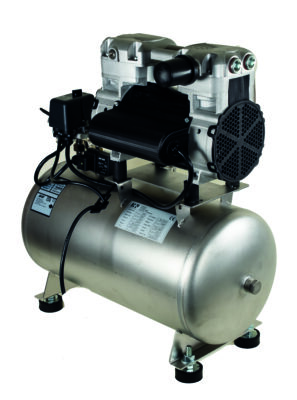
Cost-Effectiveness
Compressed air is significantly cheaper than CO2. While CO2 must be produced, purified, and stored in pressurized tanks, compressed air is simply atmospheric air that is mechanically compressed. This makes it an almost unlimited resource, reducing the supply chain complexity associated with CO2.
Tankbeer systems see substantial cost reductions over time by using compressed air. With compressed air, you can avoid the recurring expenses of purchasing and refilling CO2 tanks. Once you invest in a compressor, your only ongoing costs are related to electricity and maintenance. Most air compressors used for tankbeer systems are designed to produce low noise levels and are reliable for long periods of time.
Environmental Sustainability
CO2 is a greenhouse gas, and while using it in keg beer applications doesn’t directly contribute to climate change, its production and transportation do have environmental impacts. The extraction, processing, and shipping of CO2 require significant energy, contributing to a larger carbon footprint.
On the other hand, compressed air is just regular air that has been compressed. It’s environmentally neutral in terms of its content, and modern air compressors are becoming more energy-efficient, reducing their overall environmental impact. For venues looking to reduce their carbon footprint and operate more sustainably, a tankbeer system operating with compressed air is the greener choice.
Recent articles
Blog: comparing single-wall and double-wall beer tanks
As a brewer, you want to make sure your customers get the optimum experience when they order your beer in a bar.
Blog: Why Tankbeer Systems Are the Sustainable Choice for Breweries
As a brewer, you want to make sure your customers get the optimum experience when they order your beer in a bar.
Blog: Filling your beer tank; the do’s and don’ts
As a brewer, you want to make sure your customers get the optimum experience when they order your beer in a bar.
Blog: your first tankbeer installation and how Duotank will help you
As a brewer, you want to make sure your customers get the optimum experience when they order your beer in a bar.
Blog: tankbeer systems for stadiums and concert halls
As a brewer, you want to make sure your customers get the optimum experience when they order your beer in a bar.
Blog: understanding how a tankbeer systems keeps beer at the right temperature
As a brewer, you want to make sure your customers get the optimum experience when they order your beer in a bar.
Blog: Tankbeer transport: finding the right set-up for your unique situation
As a brewer, you want to make sure your customers get the optimum experience when they order your beer in a bar.
Blog: a deep dive into the Pressure Equipment Directive (PED)
As a brewer, you want to make sure your customers get the optimum experience when they order your beer in a bar.
Blog: Deconstructing a beer tank and how they work
As a brewer, you want to make sure your customers get the optimum experience when they order your beer in a bar.
